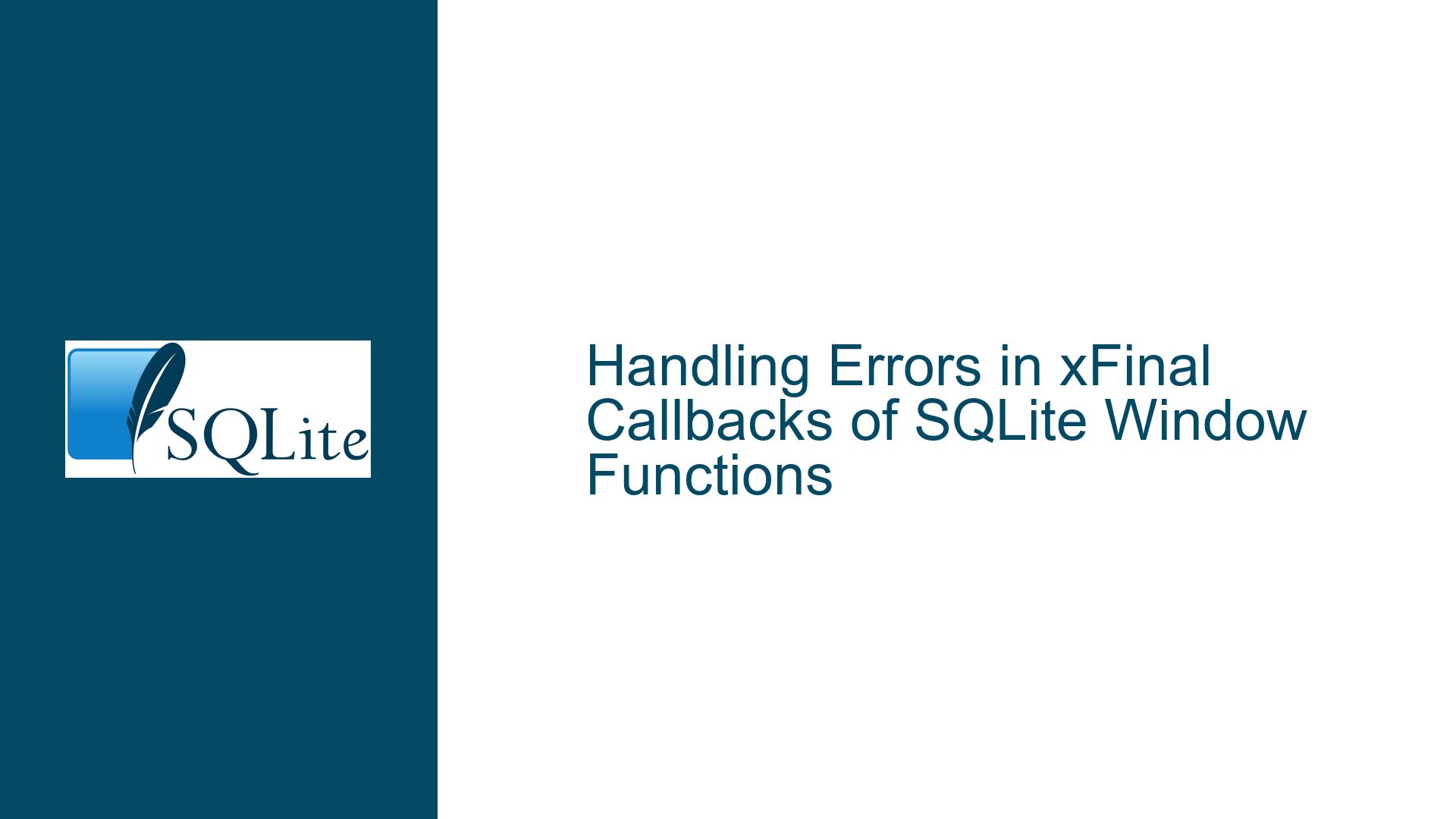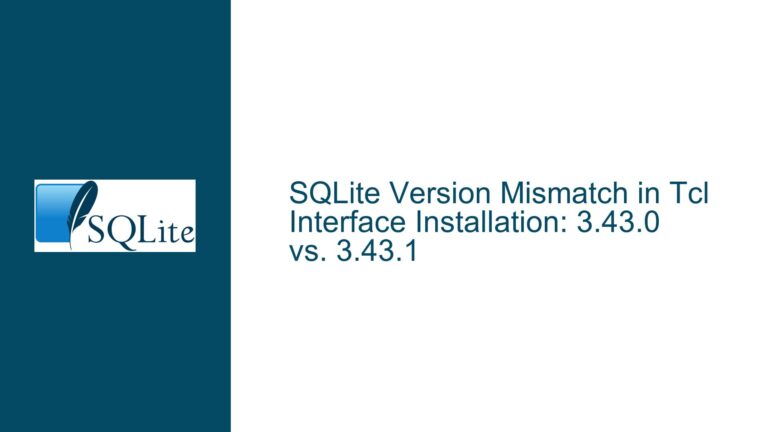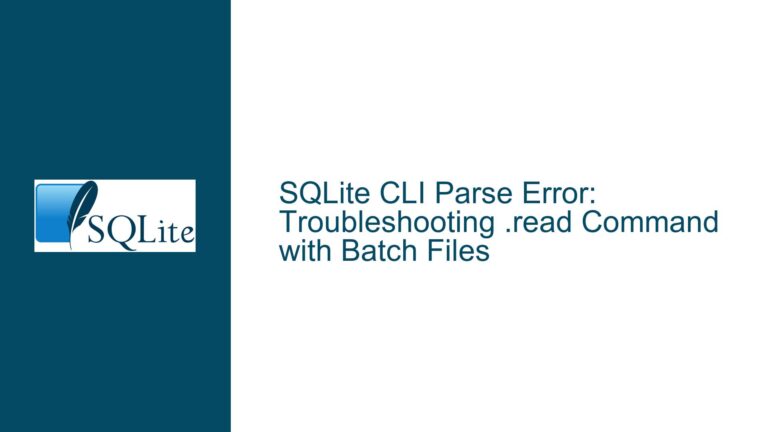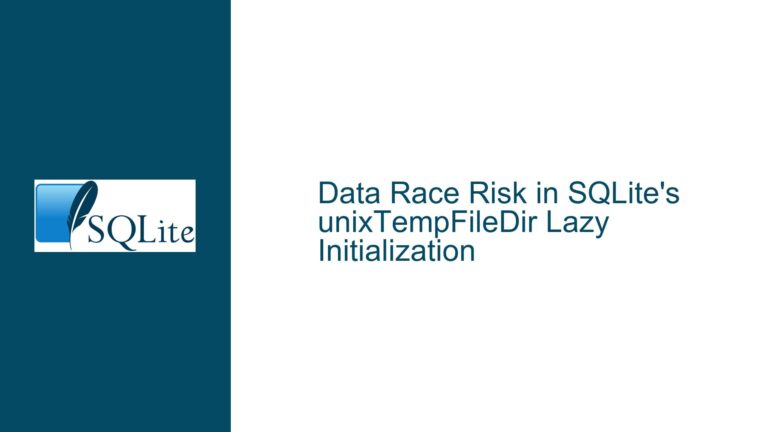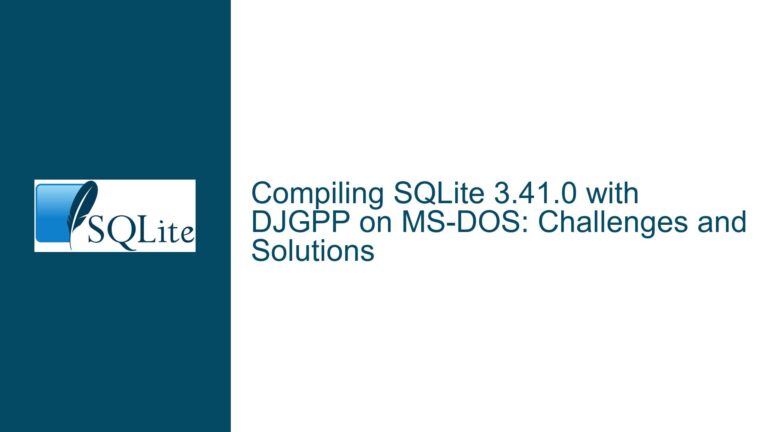Handling Errors in xFinal Callbacks of SQLite Window Functions
Understanding the Behavior of xFinal Callbacks in Window Functions
The xFinal callback in SQLite window functions is a critical component that finalizes the computation of aggregate results. Unlike regular aggregate functions, window functions operate over a set of rows defined by a window frame, and the xFinal callback is responsible for producing the final result after processing all rows in the frame. However, a peculiar issue arises when attempting to return error codes from the xFinal callback. Specifically, calling functions like sqlite3_result_error or sqlite3_result_error_code within the xFinal callback does not propagate the error as expected. Instead, sqlite3_step continues to return SQLITE_ROW or SQLITE_DONE, even when an error is set.
This behavior is counterintuitive, especially when compared to the behavior of xFinal callbacks in regular aggregate functions created with sqlite3_create_function_v2. In those cases, setting an error in the xFinal callback correctly propagates the error, causing sqlite3_step to return an error code. The discrepancy between these two scenarios suggests that the xFinal callback in window functions has unique constraints or design considerations that are not immediately obvious.
To further complicate matters, the xFinal callback in window functions may be invoked in two distinct contexts: (1) to compute and return the final result, and (2) to clean up resources allocated during the execution of the window function. In the latter case, any errors generated by the xFinal callback are ignored, as the primary purpose of the call is resource cleanup rather than result computation. This dual-purpose invocation of xFinal can lead to confusion when debugging error-handling behavior, as it may not always be clear which context is active during a given call.
Exploring the Causes of Error Propagation Issues in xFinal Callbacks
The root cause of the error propagation issue in xFinal callbacks for window functions lies in the internal mechanics of how SQLite handles window function execution. When a window function is evaluated, SQLite processes rows in the window frame using the xStep callback, which accumulates intermediate results. Once all rows are processed, the xFinal callback is invoked to produce the final result. However, SQLite may also invoke xFinal during intermediate stages of query execution to clean up resources, particularly when the query planner determines that further processing of the window function is unnecessary.
During these cleanup invocations, the xFinal callback is not expected to produce a meaningful result. Instead, its primary role is to release any memory or resources allocated during the execution of the window function. As a result, any errors set during these cleanup calls are intentionally ignored, as they do not represent a failure in the computation of the final result. This design choice ensures that resource cleanup operations do not interfere with the normal flow of query execution.
The challenge arises when developers attempt to use the xFinal callback to signal errors during result computation. Since SQLite does not distinguish between cleanup and result-computation invocations of xFinal, errors set during the latter may be inadvertently ignored if the callback is also used for cleanup. This behavior is particularly problematic in window functions, where the xFinal callback is more likely to be invoked for cleanup purposes due to the complex nature of window frame processing.
Additionally, the example provided in the SQLite documentation for user-defined aggregate window functions does not explicitly address error handling in the xFinal callback. This omission can lead to misunderstandings about the intended use of xFinal and its limitations in propagating errors. Developers may assume that the xFinal callback behaves identically in both window functions and regular aggregate functions, leading to unexpected behavior when errors are introduced.
Resolving Error Propagation Issues in xFinal Callbacks
To address the issue of error propagation in xFinal callbacks for window functions, developers must adopt a more nuanced approach to error handling. One potential solution is to introduce a mechanism for distinguishing between cleanup and result-computation invocations of the xFinal callback. This can be achieved by maintaining a flag within the aggregate context that indicates whether the current invocation of xFinal is intended to produce a result or perform cleanup.
For example, the xStep callback can set a flag in the aggregate context to indicate that result computation is required. The xFinal callback can then check this flag before attempting to set an error. If the flag indicates that the invocation is for cleanup purposes, the xFinal callback can skip error handling and focus solely on resource cleanup. If the flag indicates that result computation is required, the xFinal callback can proceed with setting the appropriate error code.
Here is an example implementation of this approach:
typedef struct {
sqlite3_int64 result;
int compute_result; // Flag to indicate if result computation is required
} MyAggregateContext;
static void xStep(sqlite3_context *ctx, int argc, sqlite3_value **argv) {
MyAggregateContext *p = (MyAggregateContext *)sqlite3_aggregate_context(ctx, sizeof(*p));
if (p) {
p->compute_result = 1; // Set flag to indicate result computation is required
// Perform accumulation logic here
}
}
static void xFinal(sqlite3_context *ctx) {
MyAggregateContext *p = (MyAggregateContext *)sqlite3_aggregate_context(ctx, 0);
if (p && p->compute_result) {
// Only set error if result computation is required
sqlite3_result_error_code(ctx, SQLITE_ERROR);
}
// Cleanup resources regardless of the flag
}
In this implementation, the compute_result flag ensures that errors are only set during invocations of xFinal that are intended to produce a result. This approach prevents errors from being ignored during cleanup invocations while maintaining the integrity of the error-handling mechanism.
Another potential solution is to leverage the sqlite3_result_error function to provide more detailed error information. While sqlite3_result_error_code sets a generic error code, sqlite3_result_error allows developers to specify a custom error message. This can be particularly useful for debugging purposes, as it provides additional context about the nature of the error.
For example:
static void xFinal(sqlite3_context *ctx) {
MyAggregateContext *p = (MyAggregateContext *)sqlite3_aggregate_context(ctx, 0);
if (p && p->compute_result) {
sqlite3_result_error(ctx, "Custom error message", -1);
}
}
By using sqlite3_result_error, developers can provide more informative error messages that help identify the root cause of the issue. This can be especially valuable in complex queries where multiple window functions are involved.
Finally, developers should carefully review the SQLite documentation and source code to gain a deeper understanding of the behavior of xFinal callbacks in window functions. The example provided in the documentation serves as a starting point, but it may not cover all edge cases or advanced use cases. By studying the implementation of built-in window functions like sum(), developers can gain insights into best practices for error handling and resource management.
In conclusion, the issue of error propagation in xFinal callbacks for SQLite window functions stems from the dual-purpose nature of the callback and the lack of explicit documentation on error handling. By introducing mechanisms to distinguish between cleanup and result-computation invocations, leveraging detailed error messages, and studying the behavior of built-in functions, developers can effectively address this issue and ensure robust error handling in their custom window functions.
